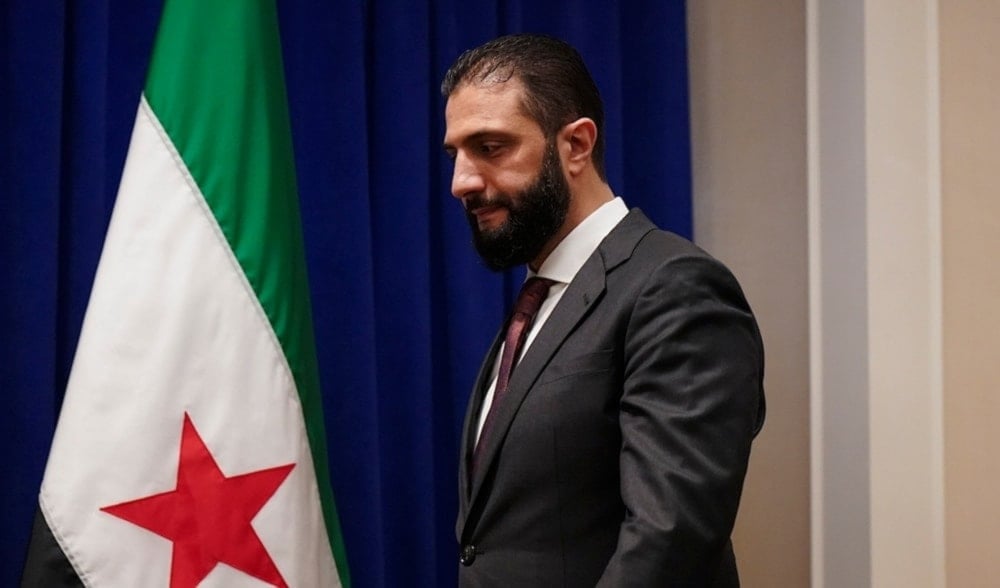Trump administration calls on Congress to repeal Caesar Act sanctions
The Trump administration is urging Congress to repeal the Caesar Act and lift remaining sanctions on Syria as part of a broader policy shift toward "regional stabilization" and "economic recovery."
-

Syrian interim President Ahmad al-Sharaa arrives ahead of a meeting at the Lotte New York Palace Hotel, on the sidelines of the 80th United Nations General Assembly at the United Nations headquarters, Monday, Sept. 22, 2025. (Bing Guan/Pool Photo via AP)
The Trump administration has expressed support for lifting US sanctions on Syria, specifically those imposed under the Caesar Act, a State Department spokesperson told RIA Novosti on Friday.
"The Administration supports repealing the Caesar Act. Congress should include repeal in the NDAA," the spokesperson said.
Enacted in 2019, the Caesar Act imposed sweeping economic sanctions on Damascus and any entities engaged in business with Syria, with the stated goal of promoting accountability for alleged human-rights violations. However, many observers note that the law was explicitly designed to exert maximum economic pressure on the Syrian state to trigger a change in government, rather than to protect civilians. The result, they argue, was the devastation of Syria’s economy and worsening humanitarian conditions without achieving the intended political transition.
According to the State Department official, removing these sanctions aligns with Washington's broader counterterrorism strategy.
"Cessation of sanctions against Syria preserves integrity of US primary objective of enduring defeat of the Islamic State (IS, ISIL, ISIS, a terrorist group banned in Russia)," the spokesperson added.
Legislative push and political debate
The administration's position builds on weeks of White House pressure on Congress to repeal the Caesar Act entirely. Al-Monitor reported on October 25 that senior officials have been working behind the scenes to convince lawmakers that the sanctions must be fully dismantled to enable Syria's economic recovery and attract foreign investment. The repeal effort follows President Trump's public pledge in May to "create a pathway for Syrian prosperity."
Despite White House backing, the move has faced fierce resistance from pro-Israeli lobbying groups in Washington, which argue that lifting sanctions could embolden Damascus and shift the regional balance of power. Within Congress, the Senate's NDAA draft currently includes an amendment from Senator Jeanne Shaheen to repeal the Caesar Act, while a counter-amendment by Senator Lindsey Graham would retain certain restrictions, requiring presidential certification that Syria refrains from military action against "Israel" and removes foreign fighters from its territory.
The administration's campaign comes after the US Department of the Treasury formally removed Syria from the sanctions list on August 25, following an executive order signed by Trump on June 30. Analysts view the step as part of a wider regional realignment, as Arab states such as Jordan, the UAE, and Saudi Arabia re-engage with Damascus and push for its full reintegration into the Arab League.
UN concerns over renewed violence
However, the policy shift coincides with growing international alarm over deteriorating security conditions inside Syria. On October 30, the UN Independent International Commission of Inquiry on Syria warned that the resurgence of mass atrocities and human-rights abuses risks undermining the fragile progress made since the fall of the previous Syrian government last year.
Commission Chair Paulo Pinheiro told the UN General Assembly that "repeated massacres and violations of human rights, including those reportedly perpetrated by interim government security forces, risk dragging the country back into conflict." The commission documented the March massacres in which approximately 1,400 people were killed across Latakia, Tartous, and Hama, many of them Alawite civilians, and reported ongoing abductions, torture, and forced displacement.
The report also raised concerns over foreign interference, pointing to the expansion of Israeli air operations into southern Syria as a factor driving further instability.
Toward a policy recalibration
If Congress votes to include the Caesar Act repeal in the National Defense Authorization Act (NDAA), it would mark the most significant reversal of US sanctions policy toward Syria in more than a decade.
The White House argues that removing the restrictions will not only revive Syria's shattered economy but also support the fight against ISIS by allowing greater regional coordination.
Read more: Russia resumes flights to Hmeimim Air Base in Syria

 4 Min Read
4 Min Read








